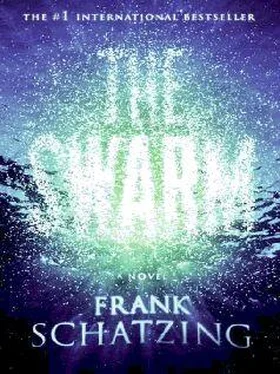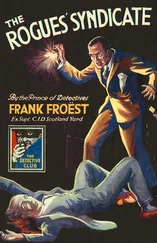But their instincts told them one thing unequivocally: the cloud was responsible for the change in the whales.
All of this was duly recorded in the report, which vanished into a hole of impenetrable darkness. The Black Hole was what they called the emergency committee, which sucked everything in without trace. Initially the Canadian government had encouraged the scientists to work alongside them, but since the US-led allied committee had been set up, all that was required of them was the provision of information. Vancouver Aquarium, the lab in Nanaimo and even the University of British Columbia were just links in a one-way chain of knowledge. The only time the scientists ever heard anything was when the committee instructed them to submit their findings, hypotheses and frustrations as reports. Neither John Ford, Leon Anawak, Rod Palm, Sue Oliviera nor Ray Fenwick had any idea how their input was being used or whether the committee agreed with their findings. Comparing their work with that of other groups was a key element of their research, and now it was being denied them.
'Things were fine,' said Ford, 'till Judith Li took the helm.'
Anawak had Oliviera on the line. 'We need to look at some more of those mussels,' she said.
'I can't get hold of anyone from Inglewood,' he told her. 'They won't talk to me, and Li's insisting that it was all an accident, a blunder with the tow line. No one's said anything about mussels.'
'But you saw them with your own eyes! And we need another sample, plus some of that weird organic substance. Why won't they co-operate? I thought they wanted our help.'
'You could try contacting the committee directly.'
'It all has to go via Ford. I don't get it, Leon. What's the point of an emergency committee, if this is what happens?'
Perhaps it was the nature of crisis squads and emergency committees to work furtively, thought Anawak. When had an emergency committee ever faced the same problem twice? Its permanent members had to get to grips with terrorism, political and military crises, all of which had to be handled in confidence. But they also faced malfunctioning nuclear power stations, broken dams, forest fires, floods, earthquakes, volcanoes and famines. Did all that have to be handled in confidence? Probably not, but it usually was.
'It's not as though we don't know what causes volcanic eruptions and earthquakes,' said Shoemaker, when Anawak voiced his frustration. 'Sure, you can be afraid of nature, but at least it never tries to catch you out or trip you up. Only people do that.'
The three were having breakfast on Leon's boat. The sun peeked out between the white clouds overhead and it was pleasantly mild, but no one was in the mood to appreciate it. Delaware was the only one with any appetite and she was demolishing a plateful of scrambled egg.
'Did you hear about the gas tanker?'
'The one that exploded near Japan?' Shoemaker took a sip of his coffee. 'That's old hat.'
Delaware shook her head. 'No. Another went down yesterday. Burst into flames in Bangkok harbour.'
'Has anyone said why?'
'No.'
'Maybe it was technical failure,' said Anawak. 'We shouldn't read too much into it.'
'You're beginning to sound like Judith Li.' Shoemaker slammed his mug on the table. 'You were right, by the way. There was practically nothing in the news about the Barrier Queen . They wrote mostly about the tug.'
Anawak wasn't surprised. The emergency committee seemed to like to keep them guessing. Maybe that was part of the game. Find your own answers. Well, he was on the case already. Straight after the plane crash Delaware had begun to scour the net. Had whales gone on the offensive anywhere else? As the taayii Haw'ilh had said: Maybe the whales aren't the problem, Leon. 'They might be just part of the problem – the only part we can see .
George Frank had hit the nail on the head, but Anawak didn't feel any the wiser for it when he saw the results of Delaware's foray. She'd browsed websites from South America, Germany, Scandinavia, France, Australia and Japan. Elsewhere the problem was jellyfish, not whales.
Jellyfish?' Shoemaker burst out laughing. 'What are they doing? Flinging themselves at boats?'
At first Anawak hadn't seen the connection either, but maybe aggressive whales and plagues of toxic stingers had something in common that wasn't readily apparent – two symptoms of an underlying problem. Delaware had found a statement by a Costa Rican scientist who seemed to think that the jellyfish terrorising South America weren't Portuguese men-of-war but a similar, as yet unidentified but infinitely more toxic species.
The problems didn't stop there.
'Around the same time that we were starting to have trouble with the whales, boats started to disappear in South America and South Africa,' Delaware said. 'Motorboats and cutters. All they found was the odd piece of debris. But when you put two and two together-'
You get a pack of vicious whales,' said Shoemaker. 'So how come we didn't hear about it earlier?'
'Well, most of the time we don't take an interest,' said Anawak. 'No one's usually bothered about what's happening in other parts of the world.'
'Either way, there've been far more shipping accidents than we've been told,' said Delaware. 'Collisions, explosions, freighters sinking… And there's the epidemic in France. It started with algae lurking in the lobster, and now a pathogen's sweeping the country. Other nations have been affected too, I think. But the more you look into it, the hazier it gets.'
From time to time Anawak felt sure they were making fools of themselves. Of course they wouldn't be the first to fall for America's favourite invention, the conspiracy theory. Every fourth US citizen harboured some kind of paranoid suspicion. According to some, Clinton had worked for the Russian secret service, and plenty of people believed in UFOs. But why would a government be interested in trying to hide events that were affecting thousands of people? Especially since keeping them secret seemed impossible in the first place.
Shoemaker was sceptical too: 'This isn't Roswell, you know. There aren't any little green men falling from the sky, or flying saucers hidden in bushes. All that conspiracy stuff- it doesn't happen in real life. I bet if a whale attacked today, the whole world would know tomorrow. And we'd know too, if something happened elsewhere.'
'OK, consider this, then,' said Delaware. 'Tofino has twelve hundred inhabitants and only three main streets. But people here don't know all there is to know about each other all of the time.'
'So what?'
'If one small town's too big to keep track of, what does that make the planet?'
'Oh, please!'
'What I'm trying to say is that the government can't always withhold news, but it can play things down. You just rein in the reporting. I bet most of what I fished out from the Internet was in the media here – we just didn't notice.'
Shoemaker squinted at her. 'Right…' he said uncertainly.
'We need more information.' said Anawak. He prodded his scrambled egg. 'Although, strictly speaking, we've got it. Or Li has.'
'So ask her for it,' said Shoemaker.
Anawak raised his eyebrows.
'If there's something you want to know, you should ask. What's the worst that could happen? A straight refusal and a kick in the teeth.'
Anawak fell silent. Li wouldn't tell him anything – Ford hadn't and he'd asked till he was blue in the face. On the other hand, Shoemaker had a point. There was a way of asking questions without anyone noticing.
Later on, when Shoemaker had left, Delaware placed a copy of the Vancouver Sun on the table in front of him. 'I didn't want to show you while Tom was around,' she said.
Anawak glanced at the front page. It was the previous day's edition. 'I've read it.'
Читать дальше












